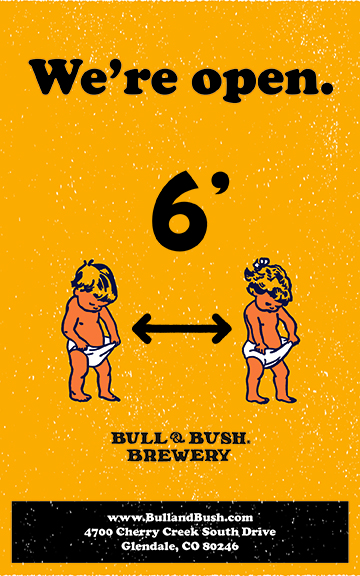
Bull and Bush



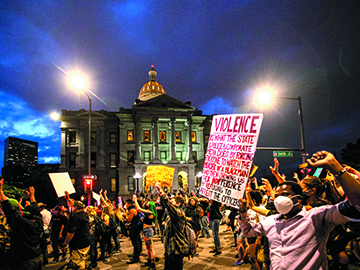
Largest, Most Costly Riots In History Devastate Denver; City Has $226 Million Budget Gap, Up $46 Million In A Month
by Glen Richardson
Already reeling from three months of city-state coronavirus shutdown orders, more than a week of protests and riots against racism and police brutality have left Denver devastated. Clashing with police, rioters looted and caused nightly property damage to businesses just as they were beginning to reopen.

In size, scope and scale, the riots are the largest and most costly in Denver’s history. Protests were longer and more destructive than any previous race riot dating back to the1880 Chinese Halloween riot on Wazee St. Neither the Holy Week protest following MLK’s Assassination or the Chicano Crusade for Justice were of the same magnitude or duration.
The Mile High City’s worst previous riot happened when the Denver Broncos won their first Super Bowl in January 1998. Thousands of fans went on a rampage overturning cars, looting and vandalizing city buildings. Smaller scale disturbances have followed other Broncos championships plus when the Avalanche won their first Stanley Cup in 1996 and again in 2001.
Capitol Carnage
Near the Capitol on Colfax Ave., down the 16th St. Mall and along South Broadway, businesses were boarded-up nightly on block after block. Many had done so as a safety precaution, but others covered damage or the properties had been vandalized. Corporate and privately owned establishments large and small worried about insurance coverage as their bank accounts, hopes and dreams drained. Since businesses were just reopening following the pandemic, employers are considering whether to postpone or return workers to downtown job sites.
Battered by days of protests, nine state buildings, including the State Capitol and adjacent monuments, were damaged or defaced. It included every set of stairs to the Capitol building, every sign, plus lights that line the walkway. Many trees plus the building’s parking lots were also damaged. Some second floor windows were smashed by rocks, including windows at the offices of Gov. Jared Polis and his chief of staff. Windows on the truck of Senate President Leroy Garcia parked outside the Capitol building were also shattered. Restoring-replacing marble, granite, brass and glass doesn’t come cheap. The state is self-insured for up to about half a million dollars.
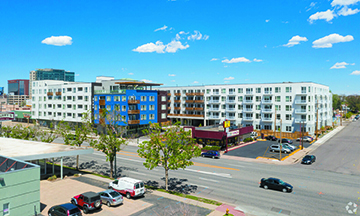
Downtown rioters claiming to seek justice, ironically vandalized a monument honoring victims of injustice. Known as the Khachkar Memorial to the Armenian Genocide, it commemorates the victims of all crimes against humanity, including racism and slavery. Initial assessment of riots by the Downtown Denver Partnership suggest that slightly more than half of the damaged properties were along the 16th Street Mall.
Budget Gap Grapple
Overtime costs for large groups of police plus the Colorado National Guard on the ground during the riots will add millions of dollars to the city’s growing budget deficit. Denver is now facing a $226 million projected budget gap for 2020, up $46 million from what the city projected just a month ago (Chronicle June).
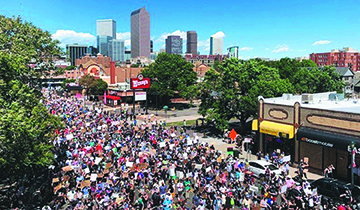
As riots stoked Denver’s financial slide, the city is reaching out to its landlords seeking rent relief. It is a tenant in 15 leases, including the Denver Post Building. Denver recently agreed to a $10 million sublease for an additional 92,000-sq.-ft. on the Post’s ninth floor. That’s in addition to space leased on floors one, seven and eight, where the city will spend about $32 million over the course of those leases.
City departments working in the Post building include Parks & Recreation, Public Health & Environment, and the Office of Emergency Management. On May 4 the City Council unanimously approved a measure proposing to defer rent for three months in exchange for extending each lease term by three months.
Rent Heebie-Jeebies
With the city’s massive apartment buildup and more units expected to open in the coming months, officials are nervously watching how Denver’s rent trends will impact the city’s outlook. Denver rents declined 0.4% in June, and are down slightly compared to the same time last year.
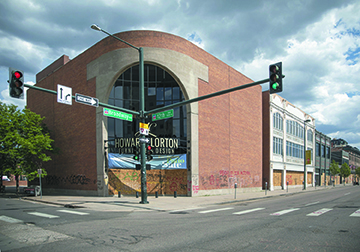
Currently, median rents in Denver stand at $1,067 for a one-bedroom and $1,351 for a two-bedroom apartment. June was the second straight month that the city has seen rents decrease after an increase in March as the pandemic hit.
Denver’s year-over-year rent growth lags the state average of 0.3%, as well as the national average of 0.8%. The dips are occurring at a time when rent growth normally picks up steam seasonally. If the trend continues it could lead to tighter competition for rental units at the middle and lower ends of the market, while luxury vacancies get harder to fill.
Cost Cutting
To battle the double-barreled economic hit, city officials say they plan to mitigate through furloughs, spending cuts, hiring slowdowns and investment prioritization. Furloughs are mandatory days off without pay. City employees must now take eight furlough days — five scheduled and three flexible — in 2020, which Mayor Hancock believes will add about $16 million back to the city’s general fund.
Of the approximate 12,000 city employees, all nonuniform employees will be required to take the furloughs. Uniformed employees, who are under collective bargaining agreements, are not required to take them — nor are elected officials,
Mayor Hancock says, however, that Denver is expediting city construction projects which he claims will, “Keep the whole ecosystem of the economy moving.”
Remodel Rein-In
Nevertheless, the Mayor has put a crucial portion of Denver’s massive National Western Center campus remodel on hold. The city’s ramshackle National Western Complex — home of the National Western Stock Show & Rodeo — is supposed to be made over into a hub where food and agricultural science meet arts and entertainment.
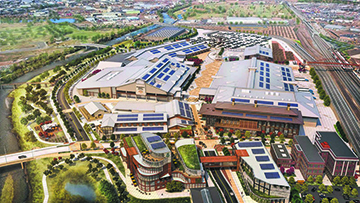
A combination of voter-approved tourism taxes and private investors are meant to pay for the project wedged between I-70 and the Platte River in Elyria-Swansea.
On hold is a key portion of the campus, known as “the Triangle” (named for its shape), with a 10,000-seat arena to replace the Denver Coliseum and host the stock show, concerts, and other events. A new exposition hall and the restoration of a 110-year-old building, which may be converted into a market, are also paused. The Triangle portion of the $1 billion National Western project is estimated at $528 million.

by Caitlin Stackpool
Besides the Fourth of July, did you know July marks the observance of Social Wellness Month? So, what does that mean, exactly? Social wellness refers to the relationships we have and how we interact with others. And for many of us, our social wellness has been put to the test over the past few months due to the COVID-19 pandemic.

Self-quarantine. Isolation. Social distancing. All are words that have become commonplace in our lives. Thankfully, many of us have found workarounds with virtual calls and limited gatherings with family and close friends.
Social wellness is an important part of one’s overall health. In fact, it’s been proven that people who are “socially well” often share some of the following health benefits.
•People who have healthy relationships respond better to stress.
•Healthy social networks enhance the immune system’s ability to fight off infectious diseases.
•Those with a strong social network tend to live longer.
“Sometimes the hardest part of maintaining our social wellness is just getting started,” said Monica B. Thompson, Senior Director, Community Integrated Health & Lifestyle Medicine, YMCA of Metro Denver. “But without a doubt, those who stay active and have solid relationships and connection with others live happier, healthier and more purposeful lives.”
So, how can you increase/build your own social wellness? Promoting your social wellness is easier than it sounds.
•Join a wellness center or an exercise group that allows you to meet new people while benefiting from exercise.
•Take a walk with your pet. A daily walking routine provides not only physical activity but also a change to meet your neighbors.
•Volunteer for a cause or organization you’re passionate about. Giving of your time will make you feel good and give you the opportunity to meet others with similar interests.
•Join a group or find others who share a hobby, such as gardening, scrapbooking, painting, etc.
Caitlin Stackpool is the Director of Community Integrated Health for the YMCA of Metropolitan Denver. With a background in clinical exercise physiology and health education, she has a passion for disease prevention through making small lifestyle changes.

After last month’s blast of wind — the strongest ever reported in Denver or in the U.S. — July is the month the sun doesn’t rise, it overflows. It is the Valley’s hottest month of the year, with an average high temperature of 88°F, while nights rarely fall below 50°F. The good news: July is actually a little less windy than most months.
Prior to the pandemic shutting down travel and hospitality, the Cherry Creek Valley was always a hot spot for vacationers since temperatures rarely top 100°F.
Here are our cool choices for shopping, dining and entertainment so a summer breeze and the sun’s rays let you shine and discover each day’s bright prospects:
3See fashions by designers, local boutiques during Denver Fashion Week at the McNichols Bldg. July 11-17, Information: denverfashionweek.com.
3View over 60 Treasures of British Art paintings on display at the Denver Art Museum, Level 2, through July 12. Information: 720-913-0130.
3If you’re considering selling your home in these uncertain times rely on the knowledge and experience of Denice and Stephanie. No none knows Denver like the RE/MAX Alliance pair. Information: 303-886.0000.
3For a dazzling selection of flowers, plants and trees go to Country Fair Garden Center. After 26 years on Colorado Blvd. they’re now located in South Lowry Square at 7150 Leetsdale Dr. Information: 303-757-4949.
3With so many events canceled this July, you won’t want to miss Beethoven’s 9th Symphony, the final completed symphony by Ludwig van Beethoven at Red Rocks Amphitheater, July 26, 7 p.m. Colorado Symphony Music Director Brett Mitchell is joined by four vocal soloists and a massive community chorus made up of the Symphony Chorus plus other choruses from around the state. Information: 303-623-7876.
It seems like many things most of us have taken for granted are canceled this year, just as Woodstock’s 50th Anniversary was canceled last July. It’s a reminder of Jimi Hendrix’s 1969 Star Spangled Banner performance at that iconic festival and the fact we again find ourselves and the country in the midst of uncertain, tentative times.
Hendrix’s rendition turned the lyrics “o’er the ramparts we watched” into a blazing protest reflecting the violence carried out under our flag and its national anthem.
Denver has more thunderstorms during July than any other month. About once every two years, an inch or more of rain drenches the city in one day during the month. Remember July 27th is Take Your Houseplants for a Walk Day. If storms develop, the lightning bolts play Rock & Roll music and your plants will be right as rain — all wet!
— Glen Richardson
The Valley Gadfly can be reached at newspaper@glendalecherrycreek.com.